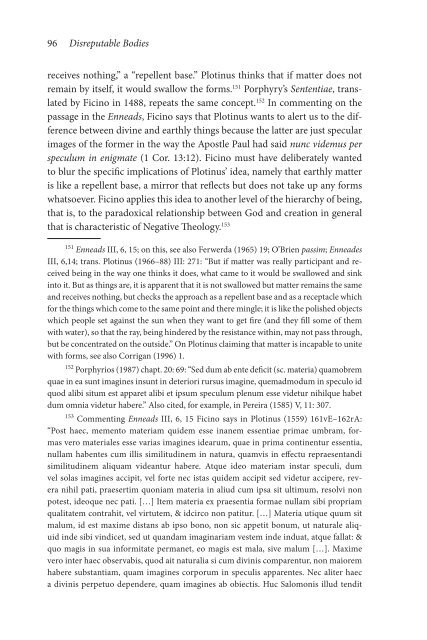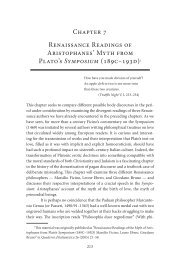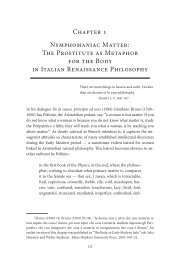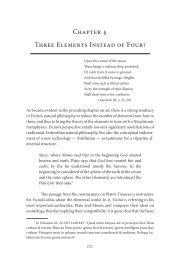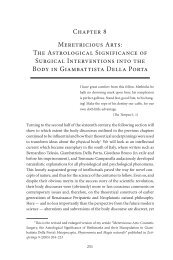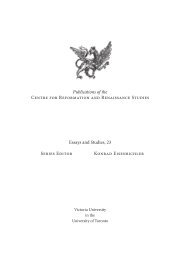Chapter 2 Matter as a Mirror: Marsilio Ficino and Renaissance ...
Chapter 2 Matter as a Mirror: Marsilio Ficino and Renaissance ...
Chapter 2 Matter as a Mirror: Marsilio Ficino and Renaissance ...
You also want an ePaper? Increase the reach of your titles
YUMPU automatically turns print PDFs into web optimized ePapers that Google loves.
96<br />
Disreputable Bodies<br />
receives nothing,” a “repellent b<strong>as</strong>e.” Plotinus thinks that if matter does not<br />
remain by itself, it would swallow the forms. 151 Porphyry’s Sententiae, translated<br />
by <strong>Ficino</strong> in 1488, repeats the same concept. 152 In commenting on the<br />
p<strong>as</strong>sage in the Enneads, <strong>Ficino</strong> says that Plotinus wants to alert us to the difference<br />
between divine <strong>and</strong> earthly things because the latter are just specular<br />
images of the former in the way the Apostle Paul had said nunc videmus per<br />
speculum in enigmate (1 Cor. 13:12). <strong>Ficino</strong> must have deliberately wanted<br />
to blur the specific implications of Plotinus’ idea, namely that earthly matter<br />
is like a repellent b<strong>as</strong>e, a mirror that reflects but does not take up any forms<br />
whatsoever. <strong>Ficino</strong> applies this idea to another level of the hierarchy of being,<br />
that is, to the paradoxical relationship between God <strong>and</strong> creation in general<br />
that is characteristic of Negative Theology. 153<br />
151 Enneads III, 6, 15; on this, see also Ferwerda (1965) 19; O’Brien p<strong>as</strong>sim; Enneades<br />
III, 6,14; trans. Plotinus (1966–88) III: 271: “But if matter w<strong>as</strong> really participant <strong>and</strong> received<br />
being in the way one thinks it does, what came to it would be swallowed <strong>and</strong> sink<br />
into it. But <strong>as</strong> things are, it is apparent that it is not swallowed but matter remains the same<br />
<strong>and</strong> receives nothing, but checks the approach <strong>as</strong> a repellent b<strong>as</strong>e <strong>and</strong> <strong>as</strong> a receptacle which<br />
for the things which come to the same point <strong>and</strong> there mingle; it is like the polished objects<br />
which people set against the sun when they want to get fire (<strong>and</strong> they fill some of them<br />
with water), so that the ray, being hindered by the resistance within, may not p<strong>as</strong>s through,<br />
but be concentrated on the outside.” On Plotinus claiming that matter is incapable to unite<br />
with forms, see also Corrigan (1996) 1.<br />
152 Porphyrios (1987) chapt. 20: 69: “Sed dum ab ente deficit (sc. materia) quamobrem<br />
quae in ea sunt imagines insunt in deteriori rursus imagine, quemadmodum in speculo id<br />
quod alibi situm est apparet alibi et ipsum speculum plenum esse videtur nihilque habet<br />
dum omnia videtur habere.” Also cited, for example, in Pereira (1585) V, 11: 307.<br />
153 Commenting Enneads III, 6, 15 <strong>Ficino</strong> says in Plotinus (1559) 161vE–162rA:<br />
“Post haec, memento materiam quidem esse inanem essentiae primae umbram, form<strong>as</strong><br />
vero materiales esse vari<strong>as</strong> imagines idearum, quae in prima continentur essentia,<br />
nullam habentes cum illis similitudinem in natura, quamvis in effectu repraesent<strong>and</strong>i<br />
similitudinem aliquam videantur habere. Atque ideo materiam instar speculi, dum<br />
vel sol<strong>as</strong> imagines accipit, vel forte nec ist<strong>as</strong> quidem accipit sed videtur accipere, revera<br />
nihil pati, praesertim quoniam materia in aliud cum ipsa sit ultimum, resolvi non<br />
potest, ideoque nec pati. […] Item materia ex praesentia formae nullam sibi propriam<br />
qualitatem contrahit, vel virtutem, & idcirco non patitur. […] Materia utique quum sit<br />
malum, id est maxime distans ab ipso bono, non sic appetit bonum, ut naturale aliquid<br />
inde sibi vindicet, sed ut qu<strong>and</strong>am imaginariam vestem inde induat, atque fallat: &<br />
quo magis in sua informitate permanet, eo magis est mala, sive malum […]. Maxime<br />
vero inter haec observabis, quod ait naturalia si cum divinis comparentur, non maiorem<br />
habere substantiam, quam imagines corporum in speculis apparentes. Nec aliter haec<br />
a divinis perpetuo dependere, quam imagines ab obiectis. Huc Salomonis illud tendit


